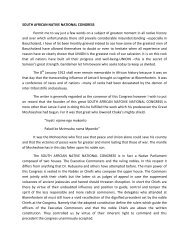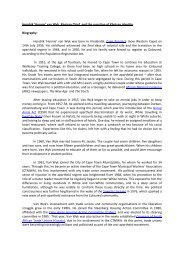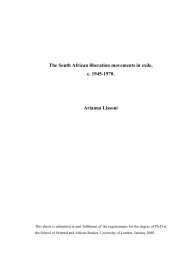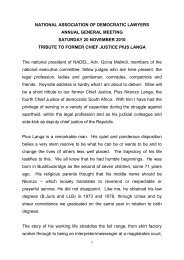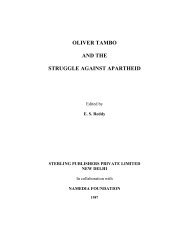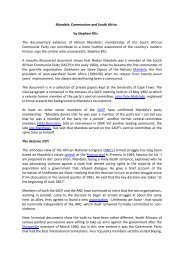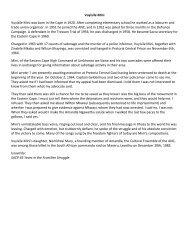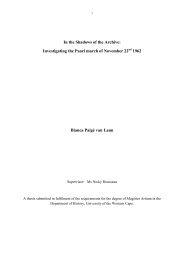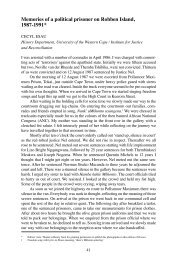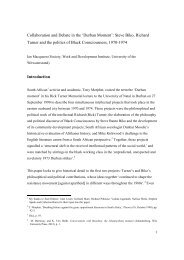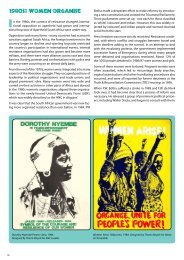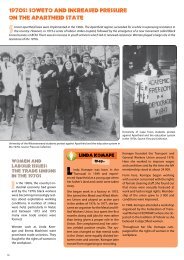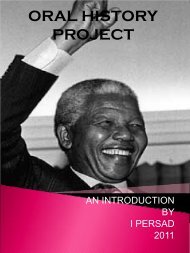Celebrating Women - South African History Online
Celebrating Women - South African History Online
Celebrating Women - South African History Online
You also want an ePaper? Increase the reach of your titles
YUMPU automatically turns print PDFs into web optimized ePapers that Google loves.
<strong>Women</strong>’s role in the 1976<br />
Soweto Revolt and<br />
mounting pressure on the<br />
Apartheid state<br />
t<br />
he 1976 Soweto riots ushered in an era of increased<br />
confrontation between the State and<br />
political organisations fighting for liberation. A new<br />
generation of young people was committed to the<br />
struggle against Apartheid. They boycotted school,<br />
and adopted the slogan ‘Liberation before education’.<br />
The youth became actively involved in politicising<br />
black communities.<br />
After 1976 the Apartheid government’s repression of<br />
the struggle increased in intensity. As a result, over<br />
14,000 students left the country and went into exile,<br />
including many girls and women. They joined MK<br />
and APLA for military training in other countries. For<br />
example, Lindiwe Sisulu joined MK and underwent<br />
military training. She later specialised in Intelligence<br />
for MK.<br />
This huge increase in the number of military trainees,<br />
and the increased resistance within <strong>South</strong> Africa,<br />
breathed new life into the liberation struggle for democracy.<br />
Students in shock and mourning over the death of a fellow protester<br />
shot by police on 16 June 1976. Source: Bailey’s <strong>African</strong><br />
<strong>History</strong> Archives.<br />
Brief summary of the<br />
1976 Revolt<br />
s<br />
oweto stands for <strong>South</strong>-West Townships, and lies<br />
to the south west of Johannesburg. It was a township<br />
set up by the government for black <strong>African</strong>s to<br />
live in. Today, the events in Soweto and around the<br />
country in 1976 are remembered in a public holiday<br />
called Youth Day every year on June 16 in <strong>South</strong> Africa.<br />
Although he did not directly take part in the Soweto<br />
riots, Steve Biko’s BC ideas motivated students.<br />
On the morning of 16 June 1976 twenty thousand<br />
school children in Soweto went on a protest march.<br />
They were protesting against having to use Afrikaans<br />
as one of the languages of instruction at school.<br />
The issue of Afrikaans was just the spark that started<br />
the Uprising - the real issue was the oppressive<br />
Apartheid laws.<br />
The march started off peacefully, but later the police<br />
opened fire on the protesting students.<br />
Chaos then broke loose throughout the whole of<br />
Soweto. Within the following week, at least 176 had<br />
died. Within the next few months, the protests and<br />
clashes with the police had spread to 160 black townships<br />
all over <strong>South</strong> Africa. 1976 was a turning point<br />
in <strong>South</strong> <strong>African</strong> history.<br />
Soweto Uprising of 1976. Marching children, protesting against the use<br />
of Afrikaans as the medium of instruction at their schools. They marched<br />
from the south western end of Soweto collecting others on their route to<br />
Orlando East. Here, the police set dogs on them and opened fire. Source:<br />
Mike Mzileni, Bailey’s <strong>African</strong> <strong>History</strong> Archive.<br />
13



